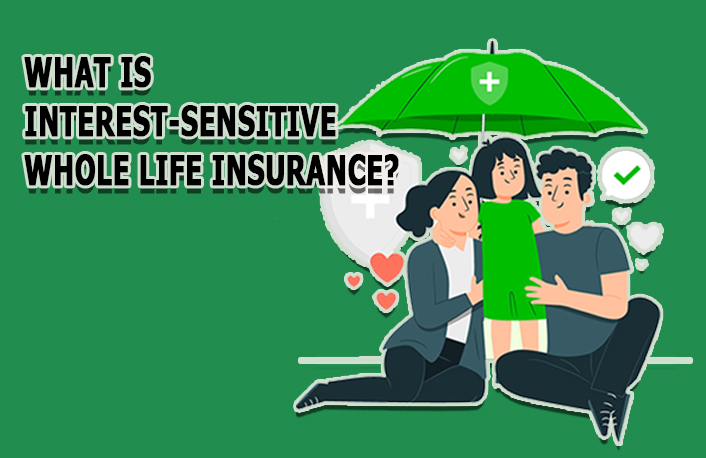Interest-sensitive whole life insurance is a type of policy whereby the cash value accumulates depending on the current interest rates rather than a fixed rate. This means that when interest rates go up, the cash value can grow faster, providing potentially higher returns.

Interest-sensitive whole life insurance is very similar to traditional whole life insurance but has a modern twist. It provides a way for policyholders to benefit from favorable economic conditions. While they are still enjoying the lifelong coverage and guarantees of a whole life policy
Understanding Interest-Sensitive Whole Life Insurance
Interest-sensitive whole-life insurance offers the same lifelong coverage and cash value growth just as traditional whole-life policies. However, it comes with a twist. These policies can sometimes be “participating.” This means you get a share of the insurer’s profits via the annual dividends.
Compared to regular whole-life policies, where premiums and death benefits remain fixed regardless of interest rates, interest-sensitive whole-life policies fluctuate with market interest rates. Just as mentioned above, when rates are up, your policy’s cash value grows faster, and your premiums may be lower. However, if rates drop, the cash value grows very slowly. Although this policy involves a lot of risk because of its sensitivity to market conditions, it also has the potential for greater rewards when interest rates are favorable.
Cons and Pros of Interest-Sensitive Whole Life Insurance
In this section, let’s take a look at some of the benefits and drawbacks of interest-sensitive whole-life insurance.
Benefits
- This policy has a Quick Response to Market Changes: The cash value in these policies is invested differently compared to the traditional ones. This allows it to better reflect current interest rates.
- Higher Returns in High-Interest Environments: When interest rates are up, the cash value of your policy accumulates faster compared with a traditional whole life insurance policy.
- Guaranteed Minimum Returns: These policies make sure that you won’t lose money, even if interest rates go down. They still earn a guaranteed minimum return.
Drawbacks
- Slower Growth in Low-Interest Environments: When interest rates are down, the growth of your policy may be limited to the guaranteed minimum rate.
- Risk of Policy Lapse: If you miss any premium payments or there isn’t enough cash value to cover the premiums, your policy could lapse.
- Lack of Investment Flexibility: just like traditional whole life insurance, these types of policies don’t offer investment choices. You can only receive the market interest rates set by the insurance provider. For more investment options, you should choose a different policy type, like variable universal life insurance.
How Much Does Interest-Sensitive Whole Life Insurance Cost
Generally, this type of policy costs more than traditional whole life insurance. Your premiums will depend on different factors like your age, coverage amount, gender, health, and lifestyle choices such as smoking or engaging in high-risk activities. Additional riders, policy fees, and how you make payments for the policy can also affect the overall cost.
Surrendering Interest-Sensitive Whole Life Insurance
Surrendering your life policy means that you want to cancel it. Just as with other types of policies, you can easily cancel interest-sensitive policies anytime you want. If you do not pay your premiums or your policy does not have enough cash value, your insurer can also cancel the policy.
When you surrender this policy, you will get a surrender value. This is the current cash value, removing any surrender fees applicable. Keep in mind that if the surrender amount is more than what you paid in premiums, you will be taxed on your gains by the government.
Final Thought
Just as I have mentioned above, interest-sensitive whole life insurance comes with higher risks. However, it also has the chance for greater growth compared to traditional policies. To get a lot of benefits from it, you’ll need to review your policy regularly. And adjust your financial plans based on market changes.
Some other similar types of life insurance policies you could go for include Excess Interest Whole Life, Current Assumption, Single Premium, and Fixed Premium Universal Life Insurance. You should speak to an insurance agent or financial advisor today to decide if this type of policy suits you. Or if a traditional whole life insurance policy would be a better choice for budget and needs.

